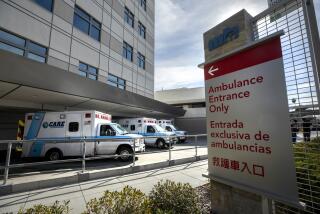A Struggling David in a Goliath World
- Share via
For years, Gish Biomedical Inc. enjoyed a profitable niche in the burgeoning field of open-heart surgery.
As surgeons opened up one chest after another, stopping the heart to perform life-saving bypasses for patients, they used Gish’s elongated tubes and other medical devices to keep the blood flowing and the patients alive.
But in the last couple of years, the Irvine company has struggled with profound changes in the way open-heart surgery is performed, as well as a slowdown in the number of open-heart surgeries.
Surgeons increasingly are opting for a surgical procedure in which the heart no longer needs to be stopped, leaving Gish pondering its future as sales of its core products shrink.
The company has lost $4.5 million over the last two years, cut staff and experienced repeated top-level upheavals. The stock has lost nearly half its value this year, slumping below $2 a share. The shares closed Wednesday at $1.78, up 6 cents, in Nasdaq trading.
Gish’s plight illustrates the perils faced by small, conservative health-care businesses in this age of supercharged technological change.
Unlike Gish, bigger medical device makers have “the access to financial and intellectual capital needed to innovate and respond quickly,” said Paul Gertler, director of the graduate program in health management at the Haas School of Business at UC Berkeley.
Medtronic Inc., for example, rolled out its Octopus instrument nearly two years ago when the new open-heart surgery method was gaining adherents, said Dan Pelak, a company vice president. The instrument, which stabilizes the heart during surgery, could generate sales of $40 million this year. That’s barely a blip on the radar screen for Minneapolis-based Medtronic, which logs $5 billion in annual revenue, but it’s more than double Gish’s annual sales of $17.7 million.
“If you’re going to be in our business and survive, you’ve got to continually obsolete yourself,” Pelak said.
That’s not to say tiny businesses can’t survive or even flourish. But small companies wedded to yesterday’s products face an uncertain future.
In Gish’s case, the company derives more than half its revenue from devices used in the heart-bypass procedure that is losing favor. It has no products for the new procedure and won’t introduce any for at least 18 months, said Gish clinical specialist Daryl Kirby.
Kirby questioned whether the newer surgical procedure will become as popular as expected, noting that it is more difficult to perform.
Chief Executive Kelly D. Scott said he’s optimistic that Gish cardiac devices, along with those in such areas as orthopedic surgery and cancer treatments, can attract new customers.
The number of patients undergoing open-heart bypass surgery in the U.S has leveled off at slightly more than 350,000 annually since 1995, further clouding the company’s future.
That figure is expected to decline in upcoming years because of better drugs and heart therapies, including the increased use of angioplasty balloons and stents to clear debris from obstructed arteries, said Thom Gunderson, senior medical technology analyst at US Bancorp Piper Jaffray.
Gish also is being hurt by changes in the way customers buy cardiac medical devices. Hospitals and purchasing groups increasingly favor bigger companies that can offer a wider array of products and sometimes better deals, said Jon Katz, editor of Medical Device & Diagnostic Industry magazine.
“This company is not well-positioned,” said John Calcagnini, a medical analyst at CIBC World Markets in Los Angeles. “The trends are against it.”
As sales slowed and the bottom line deteriorated, the company also faced turmoil in the corporate suite. In less than two years, the company has had three chief executives and has lost three directors.
Gish embarked on two rounds of layoffs in 1999 and now employs 179 workers, a reduction of more than 15% in the last 18 months. The company has announced plans to move into smaller quarters.
To try to turn things around, Gish has tapped industry veteran Scott, 44, who became chief executive in May.
Scott has 20 years’ experience in the field, most recently as managing director of Sorin Biomedica Asia. His extensive international contacts could help the company drum up new business, former director Howard F. Bovers said.
Foreign markets account for about 20% of Gish’s sales, and Europe and Asia are “ripe for growth,” Scott said.
The key to the company’s future will depend on new products and ideas, said former Chief Executive James R. Yarter, who clashed with board members before departing in March after only four months on the job.
“If they continue doing what they’re doing now, they’re just going to continue going down,” Yarter warned.
Gish, founded 24 years ago, makes devices used with heart-lung machines during bypass surgery. Its oxygenator adds oxygen and removes carbon dioxide from blood during heart surgery. Gish also makes tubing that carries blood from the heart to the oxygenator. The company operated in the black from 1990 to 1996.
Ironically, it was a diversification effort that started the company’s slide into the red, depriving Gish of much-needed funds for developing new products, said James R. Talevich, Gish’s former chief financial officer.
In 1995, Gish paid $2.6 million in cash and stock to purchase a line of infusion pumps that supplied pain medication and other therapies to patients in their homes. After a pump delivered a fatal dose of morphine to a terminal cancer patient, Gish recalled the device and later left the business. Gish lost about $5 million on the pump, a huge financial toll for a small company.
At the same time, the new bypass surgery began to gain momentum.
Under traditional coronary bypass, the heart is stopped and cooled so the muscle is not damaged. Blood passes into a heart-lung machine, which, as the name suggests, acts as the heart and lungs during surgery.
But the heart-lung machine can contribute to strokes, postoperative infection and memory loss by “roughing up” blood cells, said Michael Mack, head of the Cardiopulmonary Research Technology Institute at the University of Texas.
The new procedure, by bypassing the heart-lung machine, avoids most of those complications. It could account for up to half of all bypass operations within five years, up from 20% this year, he said.
At Glendale Adventist Medical Center, which performs about 300 bypass surgeries a year, the new procedure was offered for the first time in February. Next year, it is expected to be used in 40% of the bypass operations, said Dr. Alfredo Rasi, chief of cardiac surgery.
The new surgery “is definitely here to stay,” Rasi said.
More to Read
Inside the business of entertainment
The Wide Shot brings you news, analysis and insights on everything from streaming wars to production — and what it all means for the future.
You may occasionally receive promotional content from the Los Angeles Times.






